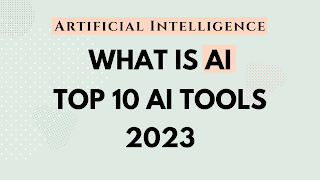What is (Ai) Artificial Intelligence? Top 10 AI Tools
In this article, we'll discuss the top ten AI tools and platforms that are currently available, each with their own unique features and capabilities.
TensorFlow: Developed by Google, TensorFlow is an open-source software library for building and training machine learning models. It's highly versatile and can be used for a wide range of applications, including image and speech recognition, natural language processing, and predictive analytics.
Keras: Keras is a user-friendly deep learning library that provides a high-level interface for building and training neural networks. It's known for its ease of use and flexibility, making it a popular choice for beginners and advanced users alike.
PyTorch: PyTorch is another popular deep learning library that's widely used in research and industry. It offers dynamic computational graphs, which make it easy to debug and experiment with different neural network architectures.IBM Watson: IBM Watson is a suite of AI tools and services that includes natural language processing, image and speech recognition, and predictive analytics. It's used by businesses and organizations to automate customer service, streamline operations, and analyze large amounts of data.
Amazon SageMaker: Amazon SageMaker is a fully-managed machine learning service that's designed to make it easy to build, train, and deploy machine learning models. It includes built-in algorithms and tools for data preparation and feature engineering.
Microsoft Azure Machine Learning: Azure Machine Learning is a cloud-based machine learning platform that's designed for developers and data scientists. It includes a wide range of tools and services for building and deploying machine learning models, including automated machine learning and visual drag-and-drop interfaces.
H2O.ai: H2O.ai is an open-source machine learning platform that's designed for large-scale data analysis. It includes a wide range of algorithms and tools for building and deploying predictive models, as well as an easy-to-use web interface.
Caffe: Caffe is a deep learning framework that's designed for image classification and segmentation. It's known for its speed and efficiency, making it a popular choice for real-time image processing applications.
Theano: Theano is another open-source deep learning framework that's designed for numerical computation. It includes a wide range of tools and libraries for building and training neural networks, as well as a user-friendly interface.
Scikit-learn: Scikit-learn is a popular Python library for machine learning and data analysis. It includes a wide range of algorithms and tools for classification, regression, and clustering, as well as tools for data preprocessing and model selection.
In conclusion, AI tools and platforms are becoming increasingly important for a wide range of applications, from research and industry to business and marketing. The top ten AI tools and platforms listed here are just a few of the many options available, each with their own unique features and capabilities. By choosing the right tools and platforms for your specific needs, you can take advantage of the latest AI technologies and achieve your goals more efficiently and effectively.